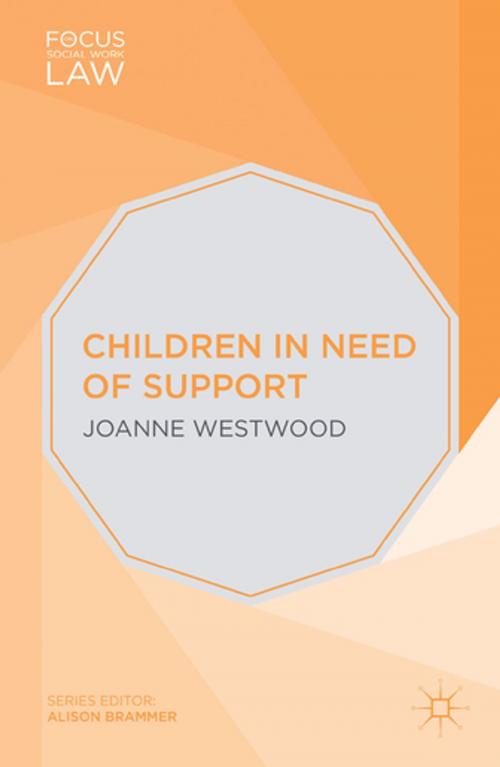| Author: | Joanne Westwood | ISBN: | 9781137286604 |
| Publisher: | Palgrave Macmillan | Publication: | September 1, 2014 |
| Imprint: | Palgrave Macmillan | Language: | English |
| Author: | Joanne Westwood |
| ISBN: | 9781137286604 |
| Publisher: | Palgrave Macmillan |
| Publication: | September 1, 2014 |
| Imprint: | Palgrave Macmillan |
| Language: | English |
In order to ensure a safe and happy environment for children in need, it is essential that the support they receive is as effective and timely as possible. It is for this reason that the interventions and support provided by practitioners working in the field is heavily governed by legislation and guidance.
Children in Need of Support provides students and practitioners with a clear and practical account of the key legislation and guidance. It begins by outlining the legal framework as it applies to working with children in need, along with the duties, powers and responsibilities of the practitioners supporting them. Linking the theory to practice scenarios, it considers the different assessment and support needs of specific groups of children, including: separated, unaccompanied and refugee children, children with harmful sexual behaviour and children with disabilities.
The text is supported by a range of innovative features and boxed information to aid learning and stimulate reflection:
- Key Case Analysis boxes summarize the details of particular legal cases and outline the implications for social work practice
- Practice Focus boxes apply legal principles and processes to practice through the use of social work scenarios
- On-The-Spot Questions reinforce understanding and encourage critical reflection
Children in Need of Support provides students and practitioners with a clear and practical account of the key legislation and guidance. It begins by outlining the legal framework as it applies to working with children in need, along with the duties, powers and responsibilities of the practitioners supporting them. Linking the theory to practice scenarios, it considers the different assessment and support needs of specific groups of children, including: separated, unaccompanied and refugee children, children with harmful sexual behaviour and children with disabilities.
The text is supported by a range of innovative features and boxed information to aid learning and stimulate reflection:
- Key Case Analysis boxes summarize the details of particular legal cases and outline the implications for social work practice
- Practice Focus boxes apply legal principles and processes to practice through the use of social work scenarios
- On-The-Spot Questions reinforce understanding and encourage critical reflection
In order to ensure a safe and happy environment for children in need, it is essential that the support they receive is as effective and timely as possible. It is for this reason that the interventions and support provided by practitioners working in the field is heavily governed by legislation and guidance.
Children in Need of Support provides students and practitioners with a clear and practical account of the key legislation and guidance. It begins by outlining the legal framework as it applies to working with children in need, along with the duties, powers and responsibilities of the practitioners supporting them. Linking the theory to practice scenarios, it considers the different assessment and support needs of specific groups of children, including: separated, unaccompanied and refugee children, children with harmful sexual behaviour and children with disabilities.
The text is supported by a range of innovative features and boxed information to aid learning and stimulate reflection:
- Key Case Analysis boxes summarize the details of particular legal cases and outline the implications for social work practice
- Practice Focus boxes apply legal principles and processes to practice through the use of social work scenarios
- On-The-Spot Questions reinforce understanding and encourage critical reflection
Children in Need of Support provides students and practitioners with a clear and practical account of the key legislation and guidance. It begins by outlining the legal framework as it applies to working with children in need, along with the duties, powers and responsibilities of the practitioners supporting them. Linking the theory to practice scenarios, it considers the different assessment and support needs of specific groups of children, including: separated, unaccompanied and refugee children, children with harmful sexual behaviour and children with disabilities.
The text is supported by a range of innovative features and boxed information to aid learning and stimulate reflection:
- Key Case Analysis boxes summarize the details of particular legal cases and outline the implications for social work practice
- Practice Focus boxes apply legal principles and processes to practice through the use of social work scenarios
- On-The-Spot Questions reinforce understanding and encourage critical reflection















